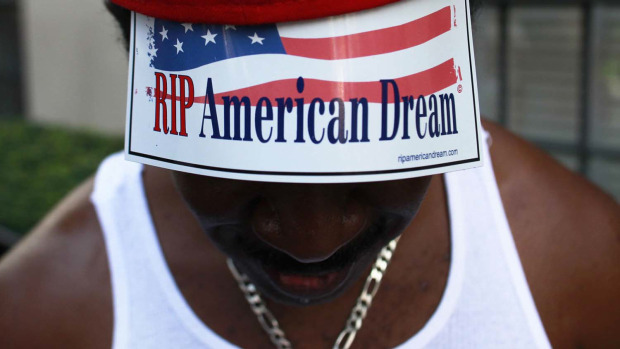What Keeps the American Dream Alive?

President Obama’s recent speech on income inequality and upward mobility has struck a chord with many Democrats. If the President keeps using this rhetoric, then it could become a central message of the 2012 campaign. If this happens, I would also bet that Elizabeth Warren will give the keynote speech at the Democratic Convention in 2012.
What’s interesting is that while there is growing awareness that America is a more unequal country, there is less awareness that America is also a less upwardly mobile society.
The Pew Economic Mobility Project has done a lot of polling on how Americans view economic mobility. In a poll conducted in May of 2011 (before Occupy Wall Street) one of the most important questions Pew asked tackled mobility directly:
Question 51:
Which of the following young people is more likely to get ahead economically?
Young person A grew up in a poor neighborhood. Young person A has the drive and ambition to get ahead.
OR
Young person B grew up in a wealthy neighborhood. Young person B lacks drive and ambition.
78% of respondents thought that a person born in a poor neighborhood but with “drive and ambition” is more likely to get ahead than a person born in a wealthy neighborhood.
This may be what people believe but simply having “drive and ambition” is not enough to actually pull yourself into a higher economic bracket. What we know is that there are certain choices that need to be made to make it more likely:
Brookings economists Ron Haskins and Isabel Sawhill studied the noneconomic components of poverty and came up with a rule. "If young people do three things — graduate from high school, get a job, and get married and wait until they're 21 before having a baby — they have an almost 75% chance of making it into the middle class," Haskins said.
What happens if you have “drive and ambition” but there are no jobs available in the economy? Or what if your parents can’t afford to send you to good schools, or the public schools in your area are terrible?
While we would like to believe that the person who is born wealthy will lose the chance to get ahead economically, I would still put money on the proposition that Person B is more likely to get ahead than Person A.
Americans also put more weight on values such as “Creativity” and “Talent” in determining where a person ends up as opposed to more mundane but important demographic facts such as whether a child grows up in a two parent family:
Question 52.
Which of the following young people is more likely to get ahead economically?
Young person C is talented and creative. Young person C grew up in a poor neighborhood.
OR
Young person D is an average student and lacks imagination. Young person D grew up in a wealthy neighborhood.
72% think the talented and creative poor student will do better than the average wealthy student who lacks imagination.
Question 53. Which of the following young people is more likely to get ahead economically?
Young person C is talented and creative. Young person C comes from a one-parent family.
OR
Young person D is an average student and lacks imagination. Young person D comes from a two parent family.
70% think the talented student from a one parent family is going to get ahead further than the average student from a two parent family.
While the American people can be admired for their optimism, it is an optimism that I think is strongly misplaced. Significant research has shown that families where both parents are working have a significant advantage over families where only one parent is working or where there is only one parent.
It's this optimism that lets Marco Rubio declare that “[America is] the only place in the world where it doesn’t matter who your parents were or where you came from. You can be anything you are willing to work hard to be.” or for Paul Ryan to argue “Telling Americans they are stuck in their current station in life, that they are victims of circumstances beyond their control, and that government’s role is to help them cope with it – well, that’s not who we are. That’s not what we do.”
This isn’t just a Republican myth, its a fundamentally American myth, and one which does not hold up under close scrutiny.
One of the (many) great challenges for public policy over the next few years will be figuring how to make the American dream a true reality. The instinct that ambition and hard work should be properly rewarded is the right one for Americans to have. Surely if Denmark can figure it out, so can the country which invented the American dream in the first place.

